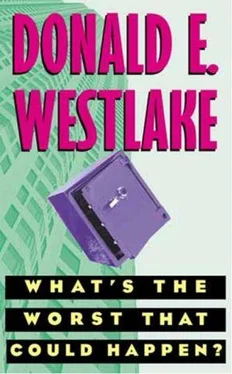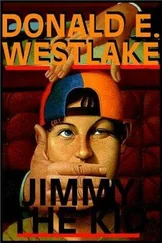“Thank you, Bernard.”
“The one nice thing about you.”
“Okay.”
“But among nonviolent crimes,” Bernard said, “the one that really gets my back up is insurance fraud.”
Andy looked surprised. “You care that much about insurance companies?”
“I don’t give a damn about insurance companies,” Bernard told him, “they’d cheat their own mothers, if they had mothers. No, what gets me about insurance fraud is, the crook is using me.”
“Ah.”
“Oh, Mr. Detective,” Bernard said, imitating a fluttery householder of indeterminate sex, “somebody broke in and stole all my goodies and here’s my list of what they took and please give me the docket number to give my insurance company, and then you can go away and run in circles trying to solve a crime that never happened.”
“Straight citizens, you’re talking about,” Andy suggested.
“They’re supposed to be straight,” Bernard said. “Sometimes, though, they get themselves professional assistance, you know?”
“You mean,” Andy said, “these are people that like hire a couple guys of the type I used to hang with before I—”
“Reformed and retired.”
“And all that. Hires them to do what they do anyway, only they bring the stuff back after the insurance is paid?”
“I think they get a cut,” Bernard said, “or maybe a flat fee. I don’t know how it works. Would you?”
“Not me,” Andy said, blinking.
“I suppose you’ve forgotten all that stuff,” Bernard agreed.
“If I ever even knew it. Are you looking for somebody that helped an honest citizen steal his own goods, Bernard? Is that what this is about?”
“Absolutely not, Andy,” Bernard said. “I know you wouldn’t give me a friend of yours.”
Nodding, Andy said, “We respect one another, Bernard. That’s why I was surprised.”
“Who I’m after,” Bernard said, “who I really and truly want, is not the guys that waltzed out of the place with the stuff, but the owner that set it up.”
“Because he’s making you part of his scam.”
“Exactly. And him I’ll get on my own.” Bernard ran his spoon around his empty bowl six or seven times, hoping to find more ice cream, then said, “But I want to be fair.”
“Of course you do.”
“Maybe this guy didn’t set it up. I admit, I feel a prejudice against him.”
“That’s big of you, Bernard.”
“He just gets my back up,” Bernard said. “But if he didn’t set up the job, I don’t want to waste my time on him, spinning my wheels, letting the real bad guys get away.”
“You want to conserve your energy,” Andy suggested.
“That’s exactly it. So I’m not asking names or anything like that, I’d just like to know in a theoretical kind of way, did any of your former associates from the bad old days, did they recently say anything about a fake burglary in midtown.”
“In midtown,” Andy echoed, frowning slightly.
“That new theater place on Broadway,” Bernard told him, “with the hotel next to it and everything. Called the N-Joy.”
“And there was a burglary in there recently?” Andy asked. “That you think it doesn’t smell right?”
“And I could be wrong, I admit that. But I was wondering,” Bernard said, “if the arrogant son of a bitch bankrupt bum that owns the place didn’t maybe set it up himself.”
“And you’d like to know,” Andy said, “if I heard from anybody that any kind of scam like that was going down anytime recently.”
“That’s it.”
Andy looked solemnly at Bernard. His eyes blinked steadily, like a metronome. He said, “I never heard a word of anything like that, Bernard. Not a word.”
Bernard looked at those blinking eyes. “Thanks, Andy,” he said, “I appreciate it.” And he waved for the check.
When Dortmunder walked into the O.J. Bar & Grill on Amsterdam Avenue at three minutes before ten on Tuesday night, Rollo the bartender, a tall meaty balding blue-jawed guy in a dirty long-sleeved white shirt and dirty white apron, was kneeling on the shelf inside the left front plate-glass window, installing a new neon beer sign. “With you in a minute,” he said, nodding to Dortmunder, his hands full of neon tubes, electric cords, and lengths of chain for hanging the thing.
“Right,” Dortmunder said, and moved toward the bar, where the regulars were discussing those black lines that’s on everything you buy now that make the cash register go beep.
“It’s a code,” the first regular was saying. “It’s a code and only the cash registers can read it.”
“Why do it in code?” the second regular asked him. “The Code War’s over.”
A third regular now hove about and steamed into the conversation, saying, “What? The Code War? It’s not the Code War, where ya been? It’s the Cold War.”
The second regular was serene with certainty. “Code,” he said. “It was the Code War because they used all those codes to keep the secrets from each other.” With a little pitying chuckle, he said, “Cold War. Why would anybody call a war cold?”
The third regular, just as certain but less serene, said, “Anybody’s been awake the last hundred years knows, it was called the Cold War because it’s always winter in Russia.”
The second regular chuckled again, an irritating sound. “Then how come,” he said, “they eat salad?”
The third regular, derailed, frowned at the second regular and said, “Salad?”
“With Russian dressing.”
Dortmunder leaned on the bar, off to the right of the main conversation, and watched Rollo in the backbar mirror. The barman also had several screwdrivers, a hammer, pliers, and a corkscrew, and was using them all, one-handed, while holding up the beer sign with the other.
Meanwhile, the conversation was continuing, as the first regular rejoined it, saying, “Code. That’s what I’m talking about, the black lines. It’s some kinda conspiracy, that’s all I know.”
A fourth regular, who until now had been using the bottles on the backbar as a kind of impromptu eye test, now reared around, righted himself, and said, “Absolutely. A conspiracy.” Closing one eye to focus on the other regulars, he said, “Which conspiracy you mean?”
“The little black lines on everything you buy,” the first regular said, bringing him up to speed.
The fourth regular considered that, closing first one eye and then the other: “That’s a conspiracy?”
“Sure. It’s in code.”
“Like the war,” said the second regular, with a smirk at the third regular.
The fourth regular nodded, closed both eyes, clutched the bar, opened both eyes, closed one eye, and said, “Which conspiracy?”
The first regular was affronted by this question. “How do I know? It’s in code, isn’t it? That’s what makes it secret. If it wasn’t in code, we’d know what it was.”
The third regular suddenly slapped the bar and said, “That’s what it is. Now I remember.”
The others all swiveled around on their stools to consider Mister Memory. The first regular said, carefully, “That’s what what is?”
“The Code War,” the third regular told him. “That’s what they call those little black lines, on accounta that’s what they’re for. When they have price wars.”
“The Code War,” the second regular announced, incensed that his definition had been taken from him, “was the war between us and Russia that’s over now.”
“Wrong,” the third regular said, showing his own brand of serenity.
The first regular said, “I think everybody’s wrong,” and called, “Rollo! What’s the name of that code, all the black lines on everything you buy?”
Читать дальше












